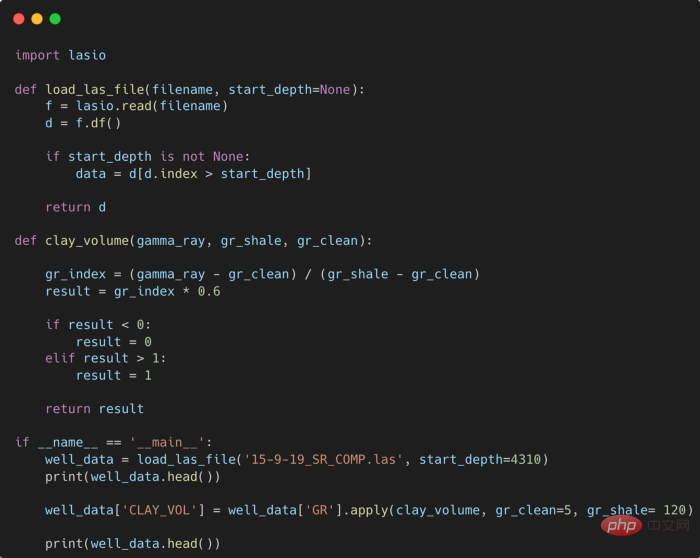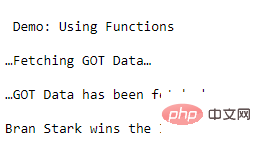in
- ?php
- $file = 'dirlist.php';
- if (is_readable($file)
== false) { - die('File does not exist or cannot be read');
- } else {
- echo 'exists';
- }
- ?>
The function to determine the existence of a file also includes file_exists (demonstrated below), but this is obviously not as comprehensive as is_readable. When a file If it exists, you can use
<ol class="dp-xml">
<li class="alt"><span><span class="tag"><span> ?php </span></span></span></li>
<li>
<span>$</span><span class="attribute">file</span><span> = </span><span class="attribute-value">"filelist.php"</span><span>; </span>
</li>
<li class="alt"><span>if (file_exists($file) == false) { </span></li>
<li><span>die('文件不存在'); </span></li>
<li class="alt"><span>} </span></li>
<li>
<span>$</span><span class="attribute">data</span><span> = </span><span class="attribute-value">file_get_contents</span><span>($file); </span>
</li>
<li class="alt"><span>echo htmlentities($data); </span></li>
<li>
<span class="tag">?></span><span> </span>
</li>
<li class="alt"><span> </span></li>
</ol>
. However, the file_get_contents function is not supported in lower versions. You can first create a handle to the file, and then use the pointer to read all :
$fso = fopen($cacheFile, 'r');
$data = fread($fso, filesize($cacheFile));
fclose($fso);
There is another way to read binary files:
$data = implode('', file($file));
 提高 Python 代码可读性的五个基本技巧Apr 12, 2023 pm 08:58 PM
提高 Python 代码可读性的五个基本技巧Apr 12, 2023 pm 08:58 PMPython 中有许多方法可以帮助我们理解代码的内部工作原理,良好的编程习惯,可以使我们的工作事半功倍!例如,我们最终可能会得到看起来很像下图中的代码。虽然不是最糟糕的,但是,我们需要扩展一些事情,例如:load_las_file 函数中的 f 和 d 代表什么?为什么我们要在 clay 函数中检查结果?这些函数需要什么类型?Floats? DataFrames?在本文中,我们将着重讨论如何通过文档、提示输入和正确的变量名称来提高应用程序/脚本的可读性的五个基本技巧。1. Comments我们可
 CRPS:贝叶斯机器学习模型的评分函数Apr 12, 2023 am 11:07 AM
CRPS:贝叶斯机器学习模型的评分函数Apr 12, 2023 am 11:07 AM连续分级概率评分(Continuous Ranked Probability Score, CRPS)或“连续概率排位分数”是一个函数或统计量,可以将分布预测与真实值进行比较。机器学习工作流程的一个重要部分是模型评估。这个过程本身可以被认为是常识:将数据分成训练集和测试集,在训练集上训练模型,并使用评分函数评估其在测试集上的性能。评分函数(或度量)是将真实值及其预测映射到一个单一且可比较的值 [1]。例如,对于连续预测可以使用 RMSE、MAE、MAPE 或 R 平方等评分函数。如果预测不是逐点
 详解JavaScript函数如何实现可变参数?(总结分享)Aug 04, 2022 pm 02:35 PM
详解JavaScript函数如何实现可变参数?(总结分享)Aug 04, 2022 pm 02:35 PMjs是弱类型语言,不能像C#那样使用param关键字来声明形参是一个可变参数。那么js中,如何实现这种可变参数呢?下面本篇文章就来聊聊JavaScript函数可变参数的实现方法,希望对大家有所帮助!
 学Python,还不知道main函数吗Apr 12, 2023 pm 02:58 PM
学Python,还不知道main函数吗Apr 12, 2023 pm 02:58 PMPython 中的 main 函数充当程序的执行点,在 Python 编程中定义 main 函数是启动程序执行的必要条件,不过它仅在程序直接运行时才执行,而在作为模块导入时不会执行。要了解有关 Python main 函数的更多信息,我们将从如下几点逐步学习:什么是 Python 函数Python 中 main 函数的功能是什么一个基本的 Python main() 是怎样的Python 执行模式Let’s get started什么是 Python 函数相信很多小伙伴对函数都不陌生了,函数是可
 Python面向对象里常见的内置成员介绍Apr 12, 2023 am 09:10 AM
Python面向对象里常见的内置成员介绍Apr 12, 2023 am 09:10 AM好嘞,今天我们继续剖析下Python里的类。[[441842]]先前我们定义类的时候,使用到了构造函数,在Python里的构造函数书写比较特殊,他是一个特殊的函数__init__,其实在类里,除了构造函数还有很多其他格式为__XXX__的函数,另外也有一些__xx__的属性。下面我们一一说下:构造函数Python里所有类的构造函数都是__init__,其中根据我们的需求,构造函数又分为有参构造函数和无惨构造函数。如果当前没有定义构造函数,那么系统会自动生成一个无参空的构造函数。例如:在有继承关系
 如何快速入门并运用PHP开发CMS系统Jun 21, 2023 am 09:36 AM
如何快速入门并运用PHP开发CMS系统Jun 21, 2023 am 09:36 AM随着互联网的发展,CMS(内容管理系统)系统成为了很多网站的必备工具,而PHP作为目前最流行的网站开发语言之一,也成为了大多数CMS系统的开发语言。如果你想快速入门并运用PHP开发CMS系统,以下是一些指导:第一步:学习PHP基础知识在学习如何使用PHP开发CMS系统之前,你需要掌握PHP的基础知识,包括如何创建基本的PHP文件、如何使用变量和数据类型、如何
 哈医大临床药学就业是否有前途(哈医大临床药学就业前景怎么样)Jan 02, 2024 pm 08:54 PM
哈医大临床药学就业是否有前途(哈医大临床药学就业前景怎么样)Jan 02, 2024 pm 08:54 PM哈医大临床药学就业前景如何尽管全国就业形势不容乐观,但药科类毕业生仍然有着良好的就业前景。总体来看,药科类毕业生的供给量少于需求量,各医药公司和制药厂是吸纳这类毕业生的主要渠道,制药行业对人才的需求也在稳步增长。据介绍,近几年药物制剂、天然药物化学等专业的研究生供需比甚至达到1∶10。临床药学专业就业方向:临床医学专业学生毕业后可在医疗卫生单位、医学科研等部门从事医疗及预防、医学科研等方面的工作。就业岗位:医药代表、医药销售代表、销售代表、销售经理、区域销售经理、招商经理、产品经理、产品专员、护
 go语言的形参占用内存吗Dec 28, 2022 pm 05:19 PM
go语言的形参占用内存吗Dec 28, 2022 pm 05:19 PM形参变量在未出现函数调用时并不占用内存,只在调用时才占用,调用结束后将释放内存。形参全称“形式参数”,是函数定义时使用的参数;但函数定义时参数是没有任实际何数据的,因而在函数被调用前没有为形参分配内存,其作用是说明自变量的类型和形态以及在过程中的作用。


Hot AI Tools

Undresser.AI Undress
AI-powered app for creating realistic nude photos

AI Clothes Remover
Online AI tool for removing clothes from photos.

Undress AI Tool
Undress images for free

Clothoff.io
AI clothes remover

AI Hentai Generator
Generate AI Hentai for free.

Hot Article

Hot Tools

PhpStorm Mac version
The latest (2018.2.1) professional PHP integrated development tool

MantisBT
Mantis is an easy-to-deploy web-based defect tracking tool designed to aid in product defect tracking. It requires PHP, MySQL and a web server. Check out our demo and hosting services.

SublimeText3 Linux new version
SublimeText3 Linux latest version

SecLists
SecLists is the ultimate security tester's companion. It is a collection of various types of lists that are frequently used during security assessments, all in one place. SecLists helps make security testing more efficient and productive by conveniently providing all the lists a security tester might need. List types include usernames, passwords, URLs, fuzzing payloads, sensitive data patterns, web shells, and more. The tester can simply pull this repository onto a new test machine and he will have access to every type of list he needs.

EditPlus Chinese cracked version
Small size, syntax highlighting, does not support code prompt function






